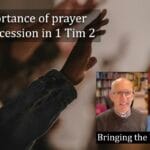The epistle for Trinity 16 in Year C is 2 Tim 1.1–14. Paul uses striking fatherly language in addressing Timothy, but also notes the way that faith has been passed to him through his biological family line—thus illustrating the two ways in which we can be fruitful in creation and kingdom.
We explore Paul’s vivid metaphors—and, in a first, James gets to sing! You have to hear it to believe it…!
The gospel reading is the very short Luke 17.5–10; you can find the video discussion here.
 Buy me a Coffee
Buy me a Coffee




























Thankyou James and Ian
Yes, a very rich passage indeed and many aspects one might profitably preach on.
One aspect that strikes me is the aspect of Trust.
Paul encourages Timothy to remember and trust what he [Paul]
has already instructed him in.
To trust in his God given calling and commissioning.
What are we to do with the deposit that God has given to us?
Perhaps that God in and by His Spirit encourages our faith, our response is to be one of Trust in God’s purposes.
It is a sad fact that many have belief in the Gospel many claiming to have some form of faith which may be passed on to our children.
Faith will be tested of what sort it is.
Our children will often see what kind of faith we have, whether a mental activity or a lived reality.
In time of testing some abandon their “faith” and show that they have little Trust in God.
Trust in the Lord with all your heart – The word “Trust” means to lie helpless, face down. It’s actually a picture of a servant who is waiting for his master’s command so that he can respond in full obedience. In other words, the focus of trust is submission.
Real trust assumes that the one whom we trust demonstrates a fortified character of honesty, fairness, truthfulness, justice, morality, ethics, and consistency.
Barnes in commenting on Psalm 62 [the epitome of Trust] comments
https://biblehub.com/commentaries/barnes/psalms/62.htm
“”My soul does sincerely confide in God; I have no other resource; I have no power to meet my foes, and I am sure – my inmost soul testifies – that my real trust is, where it ought to be, in God;
I see nothing in myself on which to rely; I see so much crime, falsehood, treachery in people, that I cannot confide in them; I have had so much painful experience of their insincerity and baseness that I cannot rely on them; but I do see that in God which leads me to trust in him, and I am sure that my heart truly does rely on him.”
My soul waiteth upon God – Margin, is silent.
Septuagint, “Is not my soul subject to God?”
So the Latin Vulgate. Luther, “My soul is still (calm) in God.”
The Hebrew word – דומיה dûmı̂yâh – means “silence, quiet, rest”; and then, a silent expectation or hope.
“The idea here is, “Truly toward God is the silent waiting of my soul”; that is, “In him alone do I trust; there is calmness of mind; I have no apprehension as to what can happen. My mind is at peace, for I feel that all is in the hands of God, and that He is worthy of entire trust and confidence.”
Some have strong faith only in their theological or philosophical stance,and are always in conflict with those of differing stances, all the while stirring and maintaining the general heated pot. No rest.
Along with teaching about faith is an urgent need to exhort Trust.
Ancient Israel had a lot of instructions about faith but failed to enter
The Land of peace and rest and abundance because of unbelief in fact because of their lack of Trust; Excepting of course just two. “Narrow is the way and few there be that find it”.
AI Overview comments:-
In Quietness and Trust | From the Inside Out
“In quietness and confidence shall be your strength” is a Bible verse from Isaiah 30:15, a passage from the Old Testament that encourages people to find salvation and strength by resting in God’s presence rather than relying on worldly alliances and fleeing from threats. It suggests that true power comes from a calm, confident trust in God, leading to inner peace and stability, contrasted with the futility of human efforts and self-reliance.
Context and Meaning
The Divine Promise:
The verse is a prophecy from the Lord God, the Holy One of Israel, spoken to the people of Judah.
A Call to Repentance:
The people were seeking help from Egypt, but God urged them to turn away from such worldly solutions.
True Salvation:
God promised, “In returning and rest you shall be saved” and “In quietness and confidence shall be your strength”.
Rejection of God’s Plan:
The people rejected this advice, saying they would flee on horses, which led to a prophecy of their swift and inevitable flight from their enemies.
Contrast with False Strength:
The verse highlights the difference between relying on human power or alliances and finding true strength in trusting God.
Application Today
Peace Amidst Chaos:
The verse encourages finding inner peace and calm by trusting in God, rather than succumbing to fear or anxiety.
Inner Transformation:
It speaks to the idea that solitude and quiet reflection can lead to a profound and positive transformation.
Trusting in God’s Ways:
It serves as a reminder that God’s ways are often beyond human understanding, and true strength comes from believing that He will provide and care for His people.
A Source of Hope:
The verse offers hope, suggesting that even when facing difficulties, finding stillness and trust in God can bring a deep and lasting strength.
Don’t leave God out of the equation.
Shalom.
Yes, and we miss the fact that ‘pistis’ in the NT, usually translated ‘faith’, actually has strong overtones of personal trust and trustworthiness.
[Paul] “He will keep that which I have commited unto Him”
I like the thought of Corrie ten Boom who said “I have held many things in my hands, and I have lost them all; but whatever I have placed in God’s hands, that, I still possess.
As C H Spurgeon remarked “Earth has no words that can convey the holy calm of a soul leaning on Jesus”.
Except the Greek says ‘he will keep my deposit’. So the question is whether it is the thing God has deposited to him, or the thing that he has deposited to God.
I am not aware of this ‘deposit’ language being used anywhere else for what Paul has entrusted to God.
For me it matters not a jot or tittle what Paul commited to God.
Whatever it was he trusted God to keep it.
…. I know whom I have believed, and am convinced that he is able to guard what I have entrusted to him until that day.
The clue is in the phrase “…. that he is able to guard what I have entrusted to him… NIV
For I know whom I have believed.—Better rendered, whom I have trusted; yea, and still trust. “Whom” here refers to God the Father. ELLICOTT
In Josephus, a writer of the same age, the soul is especially termed a parakatatheke—deposit.
Philo, also, who may almost be termed a contemporary of St. Paul, uses the very same expression, and also calls the soul “a deposit” Alford.
Paul, with death immediately before him, had two deposits, one to be committed to the Lord, and another to Timothy.—φυλάξαι, to keep) even in death.—ἐκείνην, that) 2 Timothy 1:18, ch. 2 Timothy 4:8.